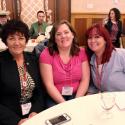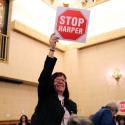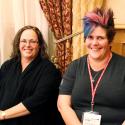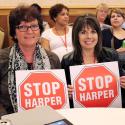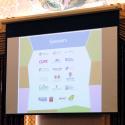Hundreds of childcare activists gathered in Winnipeg for the ChildCare 2020 National Conference, November 13-15. Among them were a delegation of PSAC members, including Prairies REVP Marianne Hladun and three Prairies activists.
Sherry Hunt, a childcare activist in Lethbridge and Prairie Region Council representative, attended the conference and shared her experiences.
It starts with a vision. ChildCare 2020 was all about bringing the vison of an accessible, quality, affordable and publically funded system of early education and care to reality in Canada by the year 2020. With 600+ activists, advocates, workers and parents in the room, it was this common vision that would bring us together for the weekend.
To open the conference, keynote speaker Stephen Lewis entertained and educated the audience for the better part of the hour. At one point he pondered aloud about how the Conservatives were able to steer conversation away from child care and on to ideological tax policy. Other speakers for the opening plenary included an opening address by Manitoba Premier Greg Selinger, and CUPE National President Paul Moist who introduced their child care action video.
The need for labour involvement in this movement was a common theme and most of the larger unions were there, as well as the Canadian Labour Congress and Manitoba Federation of Labour. Each made a contribution to the conference including UFCW’s “Re-think Child Care” post cards, broad union support and participation in the “Kitchen Table Conversations” campaign, and PSAC's animated short video.
It has long been the lament of advocates that the main difficulty in building a movement behind quality, accessible, early learning and care was that we had little way to express our vision to the rest of Canadians. I would like to thank the PSAC for putting this vision to life in a format that is easily shared and understood by the public and places the value of a national child care program in a realistic and desirable, attainable light.
On the second day, we heard from true visionaries in child care policy, including Martha Friendly, Executive Director of the Childcare Resource and Research Unit and one of the main organizers. She has attended all four previous national childcare policy conferences, spanning decades. Friendly made a strong case for the economic and social value of a comprehensive and inclusive system of care for Canadian children. (See Martha’s testimony in the now famous Johnstone vs CBSA Supreme Court decision)
Later that day I attended “How Will Governments Pay for a Child Care system?” hosted by Angella McEwan, Senior Economist at the Canadian Labour Congress and Broadbent Institute Fellow. The workshop also included Bill Moore-Kilgannon, Public Interest Alberta Executive Director; Kathleen Lahey, Queen’s University law professor; and Toby Sanger, CUPE economist.
The major theme was that the money for the undertaking of a national social program is not only there, but building such a system would be beneficial from an economic standpoint for the entire country. Dr. Lahey’s presentation was an eye opener to anyone that would characterize income splitting as being beneficial. She pointed out through her analysis of the Conservative's income splitting policy that it is an anti-equity tax policy, and that equity from an economic stand point isn't possible for women unless there is access to early learning and care for their children.
Bill Moore-Killganon (PIA) talked about the “Albert Could” campaign. According to the data, the “flat tax” regime ensures that the richest Albertans (less than 3 per cent) are the only people that benefit from this uniquely Albertan and regressive taxation policy. One of the features of the Alberta Could campaign is a tax revenue ticker that counts the revenue Alberta could collect if it adopted a more progressive tax rate.
In my role as Chair of the Public Interest Alberta, Child Care Task-Force, I organized a "self session" over the lunch break and was able to meet with other Albertans at the conference that were interested in networking and having a casual, facilitated conversation about early learning in Alberta. Much of the conversation centered on Alberta’s impending adoption of a new curriculum. Many early childhood educators approve of the curriculum, but they doubt our capacity to deliver considering cuts to post secondary and challenges within the field, such as low wages and high staff turnover. Not to mention a lack of federal investment.
Later that day, Thomas Mulcair, federal opposition leader, spoke about the recently announced NDP plan for a system that would deliver quality, accessible child care at only $15 per day. While many, including myself, would argue that this plan is short on details so far and doesn’t go far enough, the plan may be the impetus to make child care a key election issue in the 2015 federal election.
The last day began with a caucus meeting for PSAC members where we strategized about actions we can take and discussed the sessions we attended. It was a good chance to discuss the PSAC’s role in this movement and to get to know the other advocates within our union.
We immediately broke into sessions for the morning and I attended a workshop on messaging, with the Canadian Centre for Policy Alternative’s Trish Hennessey. The lesson of the morning was really how we could improve our own messaging around child care by how we frame our argument. We were guided through the PowerPoint on Conservative and Progressive messaging and the strengths and failures of each. Notably that the word “choice” has been completely coopted by the right and that the word “option” is better suited to our advocacy. Framing, Hennessey describes, is about values, we all have a set and framing is about identifying and changing not what people know – but how they feel. While progressives respond to a framework of social responsibility and collective action, Conservative framework is more about individualism and “choice”. I think this lesson can be brought into a wider social justice application, as well as in the child care movement.
We had a lunch time labour caucus that went over the CLC Re-Think Child Care campaign. This was followed by a panel featuring Olivia Chow (NDP) and Ken Dryden (LPC), political figures that have both been strong allies for a national child care program. Notably absent from the conference was any represenation from the Conservative Party of Canada and the Progressive Conservative Party of Manitoba.
The weekend closed leaving a more informed, energized crowd of activists, advocates, workers and parents. A group brought together by the common goal to improve the lives of families in Canada. Friendships were made and deepened and each of us went home with new advocacy tools.
While I have described just a few of the highlights here, there were many over the days spent at ChildCare 2020. I would like to thank the PSAC for supporting the ChildCare 2020 Conference, contributing in so many ways and for sending a dedicated group of activists to add to this national conversation.
ChildCare 2020 Photos
Photos from the ChildCare 2020 National Conference, held November 13-15, 2014 in Winnipeg. ChildCare 2020 is the first national child care policy conference in a decade and the fourth such conference in Canada’s history. The main goal of the conference is renewed action on early learning and child care.







